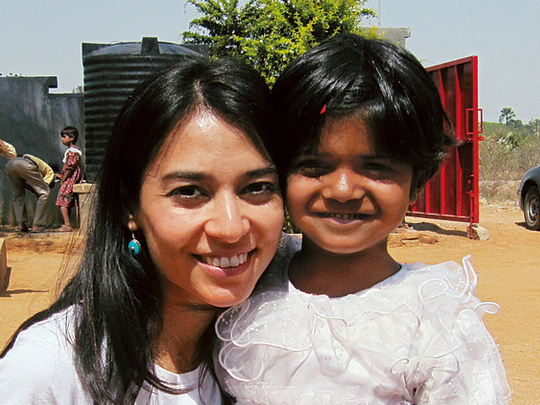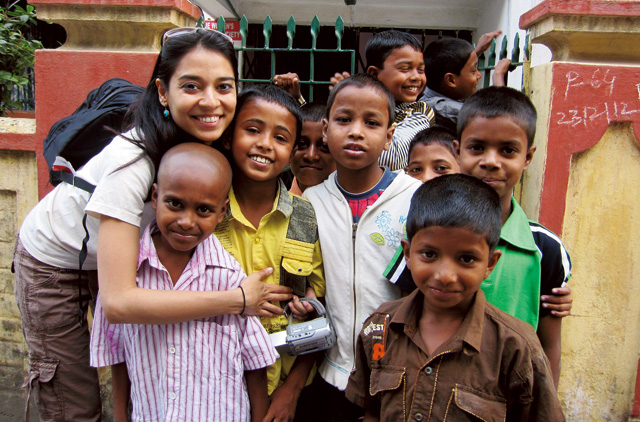
Why would a hotshot 30-something manager of one of the largest independent advertising agencies in the US, with billings of over $1billion, choose to leave it all behind to raise funds to feed and educate street children in India?
For most, it would have to be something really drastic, but for Tanya Pinto it was just a nagging desire to help orphans.
When you get to know Tanya it's not difficult to imagine her breaking for a pause in her executive lifestyle and taking off in an entirely different direction. She's dressed in a simple top and faded jeans, her face free of any make-up. She's very slim and her emotions are close to the surface. Her eyes well up frequently while talking about the unfortunate children she's met.
She had to listen to her heart
It's hard to believe when you see her, but six years ago this pretty, brand manager at the US-based The Richards Group had been living the dream life of every young person - a rising star in the advertising world, she was travelling the globe, had a large circle of friends and a supportive family to return home to in Dallas.
But the fast-paced lifestyle couldn't dull the growing urge to listen to what her heart was telling her to do. She decided to take a three-month sabbatical, while she reconnected with her home country India. "I always had a vague idea of working with orphans," says Tanya, brushing away her tears. So which better place to experience it than Nobel Peace Prize winner Mother Teresa's Shishu Bhavan orphanage and Nirmal Hriday home for the dying in Kolkata?
The moment she stepped into the humid Kolkata air Tanya knew this was her calling. Her privileged international upbringing - Tanya was born in India, moved to Dubai at six months with her parents, emigrated to Perth, Australia at age 13 and then to Dallas after completing an honours degree in Mass Communication - didn't prepare her for the extremes of suffering in Kolkata's slums.
"I saw children living in unimaginable poverty, some of them in conditions that are truly inhumane," she says.
But paradoxically she embraced it all. "I was not repulsed; I found compassion," she insists. Tanya saw that the homeless and the helpless had a dignity that could not be crushed. Their generosity left her speechless at times. "They share what they have, at the very least their smile," she says, tearing up again..
Feeding sick children, playing games with orphans as young as a few months and no older than 14, teaching, cleaning and comforting them, Tanya felt her life changing. "I did that in honour of my grandfather, but the experience changed my life," she says. "I could no longer go back to just being an advertising professional."
The seed of her charity Baal Dan was planted during this trip. Beforehand, a friend had given Tanya $50 (Dh183) to buy candy for the kids in the orphanage. But Tanya realised she could leverage the conversion rate to buy much more than sweets. After bargaining at the local markets, Tanya managed to buy 300 pairs of underwear for children, 100 notebooks and crayons, toys and pens. When Tanya emailed the friend what she'd managed to buy with his $50, and how in a small way they helped 300 children, he replied, "If I'd known $50 could help so many children, I would have given you a lot more money." That's when she realised how a little could go a long way in changing these children's lives.
Back in Dallas, Tanya decided to start her own charity based on the belief that every dollar could make a difference. "I still needed my job, so in 2006, I started Baal Dan (Hindi for Donation for children) which I worked on during my spare time," she explains.
Convinced that small efforts can pay off, Tanya started raising money from friends and co-workers. "I would tell them about the hundreds of children I saw in India - in the streets, in slums, malnourished, in some cases dying... poverty like I'd never seen before."
Working currencies to her advantage
Tanya's advantage was, given the high exchange rate against the Indian rupee, a dollar was more than enough to buy a meal, a toy or a book. "I didn't have to raise very large sums of money to make an impact," she says. "Every year I would take my vacation days, and unpaid time off my job, go back to India and travel around and search for the most deserving projects that helped children in need. These could be orphanages, sometimes rural schools, feeding programmes, or even individuals who were caring for street children. Sometimes it would be a school where I would pay the fees to take such children. As I collected more money I added more children to the list."
Tanya would work at her office from 8am to 7pm every day. That only left lunchtime, weekends, and nights for her to work on collecting funds and identifying worthwhile recipients. Her personal life became almost non-existent.
Tanya finances her own travel expenses, and she's been hospitalised four times for malnutrition, a result of infections caught in India. She even gave up her independent lifestyle, moving in with her parents to save on expenses. The inspiration was of course Mother Teresa. "I saw a poster with one of her sayings, ‘If you can't feed a hundred children, then feed just one' at Shishu Bhavan," explains Tanya. "That's what gave me the courage to start off with something, rather than be overwhelmed by the scale of the need and do nothing."
Tanya is fond of talking about a ‘higher power' that guides her. "I know how blessed I am, I feel every child should have the opportunities I had," she says. "I know that the cycle of poverty can be broken with education, but you cannot educate a child who's hungry - you have to address that first."
Baal Dan perhaps succeeded due to the lack of a large goal, staying focused on what one person could achieve. Tanya's clear vision and personal approach worked. Her fund-raising activities today include organising annual events, speaking assignments about her work, besides utilising the media and internet to solicit support. Individual donors, corporations and foundations form part of their support base.
Taking the first steps
Baal Dan first started an orphanage, Bachpan (meaning ‘childhood', in Hindi) in a small house in Barrackpore, a suburb in Kolkata, in 2009. It houses 16 girls up to the age of 14, rescued from the streets. "It was a result of the time I used to spend roaming the streets of Kolkata during my first visit," says Tanya. She saw the spirit that kept these children on the feet and wanted to do something more for them. "Last year we started Bachpan Home for boys, some of whom are siblings of the girls in the other orphanage," she says. "All of them go to regular schools. Camille, the lady who runs the orphanages, is the headmistress of a popular private school called the Sacred Heart School in Barrackpore."
Tanya is very close to the children. "I am in constant touch with the administrators who tell me who's sick, who needs what, so I know every little bit of their progress," she says. "But when I show up and the children's faces light up as we play together, that's when I feel it's really worth all the trouble."
Tanya, who was in Dubai on a stopover to the US after spending more than two months in India, says: "I visit all the projects we fund, take volunteers with me, organise kids' days, and get them what they need. I've known most of these kids from 2005. I've pictures of them as babies and as they are now."
Tanya goes by her instinct as well as ground reality when choosing recipients. One of Baal Dan's grantees, Dr Michele Harrison, is from New York. "She adopted a girl from Kolkata 34 years ago, and decided she'd return to India when she retired and work with orphans," says Tanya. "Now, she looks after 12 girls she rescued from the streets in a small apartment in Kolkata, all suffering from cerebral palsy, autism or other special needs. Baal Dan gives her $10,000 annually for their upkeep. If she needs something extra, we go the extra mile."
Baal Dan also built a school for 150 children near Varanasi that cost $30,000 two years ago. "I want people to know what's happening back home, that with just $365 you can send a child to school for a year,'' Tanya says.
Today, Baal Dan is a US-registered charity, with a board of seven people, an advisory board of 16, all volunteers. "We have chapters in Dallas, Chicago, New York, Austen, a small one in Hyderabad, India, one in Dubai, and are about to start one in London," she says. There are hundreds of volunteers who run these chapters.
"I've found a model that works, based on transparency and bonding the partner organisations based in India," says Tanya who has won the prestigious John Curtin Medal from the Curtin University, Australia for her work with orphans and the Sri Sri Ravi Shankar Award for Uplifting Human Values.
Tanya's very focused on Baal Dan and it's grown on donations from individuals, family and friends. Its net assets at the end of 2010 were $246,523, up from $24,129 in 2006, the year it was launched. All the more impressive considering that, "They come to me by word of mouth. The entire charity is built through word of mouth."
Baal Dan supports 11 projects in India - in Delhi, Hyderabad, Kolkata, Varanasi, Rishikesh and Kerala. "In some cases it's just four children, while in some it could be as high as 350."
When she looks back Tanya is struck by wonderment at where Baal Dan has reached. "When I started this I didn't think I'd raise any money," she says. "If anybody told me in six years I'd have a school with 150 kids, be running two orphanages, handling projects involving 2,000 children I wouldn't have believed them. I don't know how I got the energy to work at my advertising job and then run Baal Dan for six years at the same time. It has to be a higher source. It certainly required a lot of sacrifice but I love it and am committed to it."
So much so that she quit her job this January to run Baal Dan full-time. "I'll do some consulting work, which will give me the flexibility to travel to India when required."
What really keeps Tanya going is the growing certainty that one day she'll see the children Baal Dan's helped break the cycle of poverty and make it on their own. "Perhaps then they'll look back and think of this crazy girl who came and played with them sometimes!" she laughs.
Baal Dan's work
Baal Dan funds a school for 150 children, runs two orphanages and funds ten orphanages besides funding grassroots programmes for children. Baal Dan also sponsors medical camps, providing critical immunisations and medicine to over 250 slum children and families.
Info
More information at www.baaldan.com. The co-ordinator of the Dubai chapter, Aparna Lal, can be contacted at 055-33295 / 055-4715312. You can also contact her on email: aparnalal79@gmail.com
To book Tanya as a speaker, email tanya@baaldan.com



